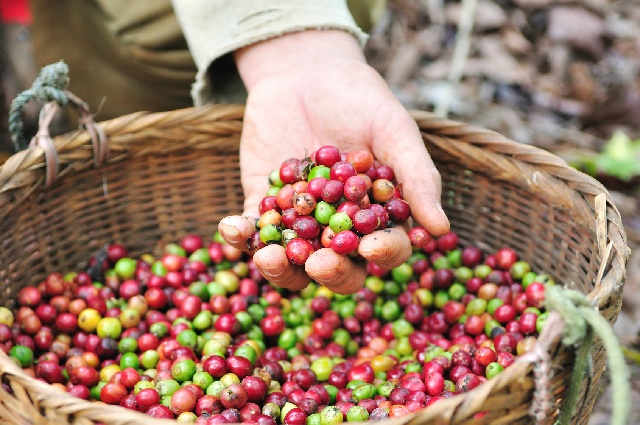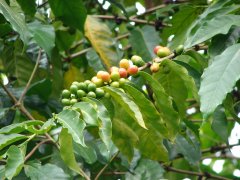When did the cultivation of Dutch coffee start? why are Dutch coffee beans rarely seen now?
For professional baristas, please follow the coffee workshop (Wechat official account cafe_style)

This time we will introduce the era when European countries began to grow coffee on a large scale. How did the plantation of this colony begin?
Coffee beans handled by European businessmen
As coffee began to spread in many parts of Europe, merchants made a huge fortune by reselling coffee beans bought in Egypt to Europe. Among them, Dutch businessmen do not want to buy their own, but grow their own coffee beans to make a profit.

Grow in Indonesia
In 1658, the Dutch East India Company (founded the world's first limited company in the Netherlands), brought "coffee saplings" to the cultivation of Indonesia in Sulawesi and Ceylon.
In 1680, now dealing with coffee seedlings from the colony of Java ordered by Mocha in Yemen, then came to the plantation in Jakarta in 1969 to be opened.
Coffee cultivation spread to the colonies
In 1706, the coffee tree arrived at the Amsterdam Botanical Garden from the Dutch island of Java. The seeds were planted in Suriname in South America and later in French Guiana.
Coffee cultivation further spread to the world, and coffee trees were introduced and planted on a large scale in Brazil in South America in 1726.
Compulsory cultivation system in the Netherlands

Since 1830, the compulsory cultivation system has been implemented under the initiative of the governor of the Netherlands, "Vandenbosch". Forced cultivation of sugarcane for local residents, sugar colonies, forced to grow "high-value crops as a commodity", such as coffee, Dutch growers will get the same benefits from the movement.
It brought great benefits to the Netherlands by forcing the colonists to go to work, but it put pressure on the lives of the people. This has been carried out by farmers in self-sufficient (such as Java) colonies, where hunger is painful and this forced training system destroys the foundations of life.
The compulsory planting system, which was rebounded by residents in 1870, took local residents for a long time, and for real 40 years I was forced to abolish unreasonable labor.
The background of the Dutch Financial crisis
The mandatory planting system is not the dissemination of coffee, but a policy to rebuild Dutch finance. As a result of the French revolution in July, Belgium will have created an independence movement in the Netherlands, and the Netherlands has begun to have a crush on sending troops.
As a result, Belgium became independent, and it seemed to be costly and economically costly to the army as a result of the withdrawal of Belgian industrial areas.
Coffee cultivation was enforced as a result of the financial crisis in the Netherlands
The coffee currently produced in Indonesia comes from residues that were forcibly planted in the Netherlands at that time. Because of the wealth we gained from commercial crops such as coffee, the Netherlands achieved the industrial revolution, but lagged behind European countries.
Although there is a mandatory aspect, I am surprised that it has been practiced on a large scale and continues to this day. Although there is still a legacy of a "colony", it is said to have not been infected with resentment. It is a historical fact that you have noticed that coffee is a special luxury in any country.
Important Notice :
前街咖啡 FrontStreet Coffee has moved to new addredd:
FrontStreet Coffee Address: 315,Donghua East Road,GuangZhou
Tel:020 38364473
- Prev

How coffee spread on the island of Reunion: an introduction to the Louis Coffee Dynasty in the world
For the exchange of professional baristas, please follow the coffee workshop (Wechat official account cafe_style) this time. At the beginning of coffee cultivation, I will introduce the incidents about coffee varieties raised in different places. At that time, there were two kinds of coffee, one was grown by hand and coffee, and grew naturally. You have experienced a sudden change in transmission, and we continue to increase the number of breeding species, at this time
- Next

Mexican Coffee West Co-op Featured Coffee Flavors How to Mexican Coffee Recommended Introduction
Weixin Official Accounts cafe_style) Production area: Oaxaca Producer: Xike Cooperative Treatment method: Traditional washing treatment classification: European washed very hard beans (SHB) Variety: Caturra Elevation: 1200 to 1800 meters Flavor description: nuts, low acidity, spice cream, slightly cool herbs
Related
- Beginners will see the "Coffee pull flower" guide!
- What is the difference between ice blog purified milk and ordinary milk coffee?
- Why is the Philippines the largest producer of crops in Liberia?
- For coffee extraction, should the fine powder be retained?
- How does extracted espresso fill pressed powder? How much strength does it take to press the powder?
- How to make jasmine cold extract coffee? Is the jasmine + latte good?
- Will this little toy really make the coffee taste better? How does Lily Drip affect coffee extraction?
- Will the action of slapping the filter cup also affect coffee extraction?
- What's the difference between powder-to-water ratio and powder-to-liquid ratio?
- What is the Ethiopian local species? What does it have to do with Heirloom native species?

